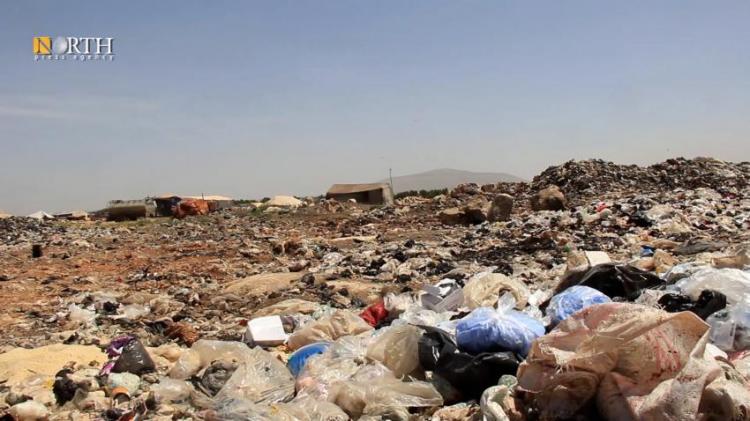Idlib – North-Press Agency
Random camps for internally displaced persons are spread around the largest garbage dump near the village of al-Bardaqli in the Deir Hassan area in the Idlib northern countryside, which raises the concerns of those camps' residents with increased cases of respiratory and skin diseases due to the expansion of the dump and its further approach towards the tents.
More than 13 random camps are gathering in the Deir Hassan area, which were established during the recent wave of civilians' displacement from the southern and eastern countrysides of Idlib as a result of the military operation by Syrian government forces early this year.
Muhammad al-Omar,.a displaced person from the western countryside of Hama and one of the residents of the Bdr Hafas camp, told North-Press that he suffers from many lung diseases, like asthma and severe coughing, due to the smoke caused by burning garbage in the landfill, stressing that they have asked to remove it more than once but "all in vain."
Muhammad al-Halabi, a displaced person from the western countryside of Aleppo who lives in the Ketian camp, said that they had to live in the al-Bardaqli area because they did not find another place, describing their displacement trip as “escaping from bombing to a slow death."
Al-Halabi called on all civil and humanitarian organizations to consider their conditions in the camp, which lacks minimum healthcare and services.
Residents of these camps say that they have repeatedly considered moving to another place due to increased respiratory health problems among them, but the lack of another alternative forces them to stay and face health risks.
Khaled al-Ibrahim, director of the Ketian camp, said that they were forced to build a random camp near the garbage dump because there was no place to house them when they were displaced from the western countryside of Aleppo, due to intense bombing last February.
He pointed out that in the winter they suffered from rain water coming through landfill waste to the center of the camp after it was contaminated, while in the summer they suffer from the spread of odors, skin and respiratory diseases due to the burning of waste in the landfill.
"There is the problem of the lack of a sanitation service as well, which increases the suffering of the IDPs, especially in the summer, where the insects increase due to the open sewage, which leads to the spread of leishmaniasis infections among the displaced people," al-Ibrahim added.
Al-Ibrahim called on the humanitarian organizations to intervene to move the landfill or to find a suitable place for the IDPs and the camps away from the waste.
He said: "We vainly tried to attract many concerned parties to consider the issue seriously."
According to the report of the United Nations Office for the Coordination of Humanitarian Affairs issued on the 27th of March, these camps need an increase in the allocations of water, sanitation and cleanliness services, where more than 64,000 people lacking adequate ways to get rid of waste. More than 32,000 are lacking sanitation services, and more than 108,000 are in need of hygiene kits.

